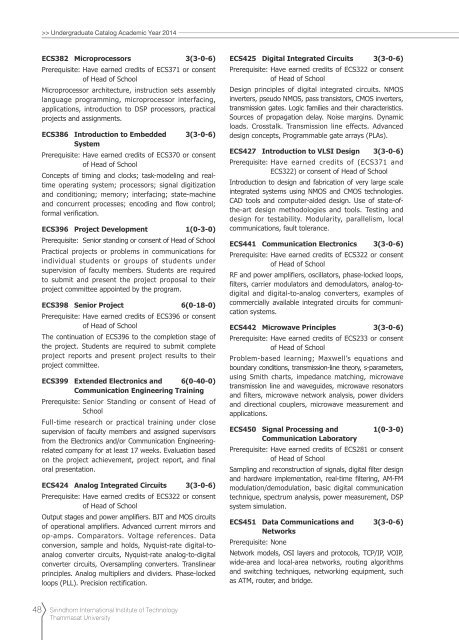undergrad2014
undergrad2014
undergrad2014
You also want an ePaper? Increase the reach of your titles
YUMPU automatically turns print PDFs into web optimized ePapers that Google loves.
Undergraduate Catalog Academic Year 2014<br />
ECS382 Microprocessors<br />
3(3-0-6)<br />
Prerequisite: Have earned credits of ECS371 or consent <br />
of Head of School<br />
Microprocessor architecture, instruction sets assembly<br />
language programming, microprocessor interfacing,<br />
applications, introduction to DSP processors, practical<br />
projects and assignments.<br />
ECS386 Introduction to Embedded<br />
System<br />
3(3-0-6)<br />
Prerequisite: Have earned credits of ECS370 or consent <br />
of Head of School<br />
Concepts of timing and clocks; task-modeling and realtime<br />
operating system; processors; signal digitization<br />
and conditioning; memory; interfacing; state-machine<br />
and concurrent processes; encoding and flow control;<br />
formal verification.<br />
ECS396 Project Development<br />
1(0-3-0)<br />
Prerequisite: Senior standing or consent of Head of School<br />
Practical projects or problems in communications for<br />
individual students or groups of students under<br />
supervision of faculty members. Students are required<br />
to submit and present the project proposal to their<br />
project committee appointed by the program.<br />
ECS398 Senior Project<br />
6(0-18-0)<br />
Prerequisite: Have earned credits of ECS396 or consent <br />
of Head of School<br />
The continuation of ECS396 to the completion stage of<br />
the project. Students are required to submit complete<br />
project reports and present project results to their<br />
project committee.<br />
ECS399 Extended Electronics and 6(0-40-0)<br />
Communication Engineering Training<br />
Prerequisite: Senior Standing or consent of Head of <br />
School<br />
Full-time research or practical training under close<br />
supervision of faculty members and assigned supervisors<br />
from the Electronics and/or Communication Engineeringrelated<br />
company for at least 17 weeks. Evaluation based<br />
on the project achievement, project report, and final<br />
oral presentation.<br />
ECS424 Analog Integrated Circuits<br />
3(3-0-6)<br />
Prerequisite: Have earned credits of ECS322 or consent <br />
of Head of School<br />
Output stages and power amplifiers. BJT and MOS circuits<br />
of operational amplifiers. Advanced current mirrors and<br />
op-amps. Comparators. Voltage references. Data<br />
conversion, sample and holds, Nyquist-rate digital-toanalog<br />
converter circuits, Nyquist-rate analog-to-digital<br />
converter circuits, Oversampling converters. Translinear<br />
principles. Analog multipliers and dividers. Phase-locked<br />
loops (PLL). Precision rectification.<br />
ECS425 Digital Integrated Circuits<br />
3(3-0-6)<br />
Prerequisite: Have earned credits of ECS322 or consent <br />
of Head of School<br />
Design principles of digital integrated circuits. NMOS<br />
inverters, pseudo NMOS, pass transistors, CMOS inverters,<br />
transmission gates. Logic families and their characteristics.<br />
Sources of propagation delay. Noise margins. Dynamic<br />
loads. Crosstalk. Transmission line effects. Advanced<br />
design concepts, Programmable gate arrays (PLAs).<br />
ECS427 Introduction to VLSI Design<br />
3(3-0-6)<br />
Prerequisite: Have earned credits of (ECS371 and <br />
ECS322) or consent of Head of School<br />
Introduction to design and fabrication of very large scale<br />
integrated systems using NMOS and CMOS technologies.<br />
CAD tools and computer-aided design. Use of state-ofthe-art<br />
design methodologies and tools. Testing and<br />
design for testability. Modularity, parallelism, local<br />
communications, fault tolerance.<br />
ECS441 Communication Electronics<br />
3(3-0-6)<br />
Prerequisite: Have earned credits of ECS322 or consent <br />
of Head of School<br />
RF and power amplifiers, oscillators, phase-locked loops,<br />
filters, carrier modulators and demodulators, analog-todigital<br />
and digital-to-analog converters, examples of<br />
commercially available integrated circuits for communication<br />
systems.<br />
ECS442 Microwave Principles<br />
3(3-0-6)<br />
Prerequisite: Have earned credits of ECS233 or consent <br />
of Head of School<br />
Problem-based learning; Maxwell’s equations and<br />
boundary conditions, transmission-line theory, s-parameters,<br />
using Smith charts, impedance matching, microwave<br />
transmission line and waveguides, microwave resonators<br />
and filters, microwave network analysis, power dividers<br />
and directional couplers, microwave measurement and<br />
applications.<br />
ECS450 Signal Processing and<br />
Communication Laboratory<br />
1(0-3-0)<br />
Prerequisite: Have earned credits of ECS281 or consent <br />
of Head of School<br />
Sampling and reconstruction of signals, digital filter design<br />
and hardware implementation, real-time filtering, AM-FM<br />
modulation/demodulation, basic digital communication<br />
technique, spectrum analysis, power measurement, DSP<br />
system simulation.<br />
ECS451 Data Communications and<br />
Networks<br />
Prerequisite: None<br />
3(3-0-6)<br />
Network models, OSI layers and protocols, TCP/IP, VOIP,<br />
wide-area and local-area networks, routing algorithms<br />
and switching techniques, networking equipment, such<br />
as ATM, router, and bridge.<br />
48 Sirindhorn International Institute of Technology<br />
Thammasat University


